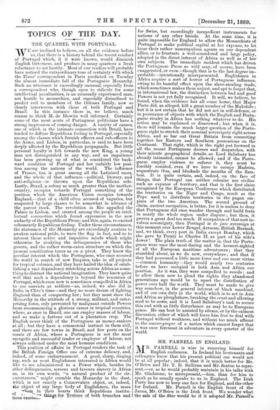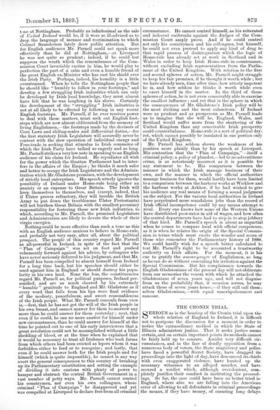MR. PARNELL IN ENGLAND.
MR. PARNELL is wise in reserving himself for English audiences. In Ireland his lieutenants and colleagues know that his present political cue would not be at all popular ; indeed, that it is much better for Mr. O'Brien and Mr. T. D. Sullivan and Mr. Sexton to repre- sent, —or, as he would probably maintain in his talks with Mr. Gladstone, to misrepresent, —him, than for him to speak as he usually speaks to us in England. The Irish Party has now to keep one face for England, and the other for Ireland. Mr. Parnell is the English front of the Janus, Mr. O'Brien is the Irish front. We wonder what the tiale of the Star would be if it adopted Mr. Parnell's tone at Nottingham. Probably as infinitesimal as the sale of United Ireland would be, if it were so ill-advised as to drop the language of menace and recrimination to which Colonel Saunderson lately drew public attention. But for English audiences Mr. Parnell could not speak more effectively than he did at Nottingham,—at Liverpool he was not quite so prudent; indeed, if he could but suppress the wrath which the remembrance of the Com- mission Court invariably excites in him, he would play to perfection the part of a calm and even a humble friend of the great English ex-Minister who has cast his shield over the Irish Party. Perhaps, indeed, his humility is a little overstrained. When he tells the Nottingham people that he should like "humbly to follow in your footsteps," and develop a few struggling Irish industries which can only be developed by Irish local knowledge, they must almost have felt that he was laughing in his sleeve. Certainly the development of the " struggling " Irish industries is not at all likely to be effected by following in any recent English footsteps. Mr. Parnell, if he ever receives power to deal with these matters, must seek out English foot- steps which are now almost obliterated from the memory of living Englishmen,—the footsteps made by the devisors of Corn Laws and sliding-scales and differential duties,—for the first statutory Irish Legislature will assuredly never be content with the slow operation of individual energy and Free-trade in seeking that stimulus to Irish commerce of which the Irish Party have talked so eagerly and so long. Mr. Parnell strikes a very low note in speaking to an English audience of his claim for Ireland. He repudiates all wish for the power which the Grattan Parliament had to inter- fere in the affairs of the Empire ; he thinks it much safer and better to occupy the Irish Legislature and the Adminis- tration which Mr. Gladstone promises, with the development of strictly local enterprises. His speech utterly ignores the possibility of Ireland under Home-rule being either an anxiety or an expense to Great Britain. The Irish will keep themselves to themselves, and (except, indeed, that if Ulster proves refractory, they will trouble the British Army to put down the troublesome Ulster Protestants) will not burthen Great Britain with the smallest pecuniary responsibility for fostering those new Irish industries, to which, according to Mr. Parnell, the promised Legislature and Administration are likely to devote the whole of their virgin energies. Nothing could be more effective than such a tone as this with an English audience anxious to believe in Home-rule, and probably not very easy, after all, about the political prospect. The people of this country regard Mr. Parnell as all-powerful in Ireland, in spite of the fact that the "Plan of Campaign" was set on foot and pushed vehemently forward against his advice, by colleagues who have never seriously deferred to his judgment, and that Mr. Parnell has been compelled to absent himself from Ireland for a long time back, lest his speeches should either be used against him in England or should destroy his popu- larity in his own land. None the less, the constituencies regard Mr. Parnell as, for political purposes, Ireland per- sonified, and are as much cheered by his extremely " humble " gratitude to England and Mr. Gladstone as if every word that falls from his lips were final evidence of the modesty, peacefulness, and sweet reasonableness of the Irish people. What Mr. Parnell conceals from view is,—first, that he has not got the will of the Irish people in his own breast, and cannot answer for them to-morrow any more than he could answer for them yesterday ; next, that even if he could, he can no more answer for himself under new circumstances, than he could answer for himself at the time he pointed out to one of his early interviewers that a great revolution could not be accomplished without a little shedding of blood, or at the time when he explained that it would be necessary to treat all Irishmen who took farms from which others had been evicted as lepers whom it was forbidden either to feed or to recognise ; and lastly, that even if he could answer both for the Irish people and for himself (which is quite impossible), he cannot in any way avert the general consequences to this country of breaking up its Parliamentary constitution and setting the example of dividing it into cantons with plenty of power to hamper and obstruct the central British Government in a vast number of petty ways. Mr. Parnell cannot control his countrymen, nor even his own colleagues, whose criminal "Plan of Campaign" he disapproved and yet was compelled at Liverpool to declare free from all criminal circumstance. He cannot control himself, as his reiterated and indecent outbreaks against the Judges of the Com- mission Court amply prove. And if he could control not only his countrymen and his colleagues,. but himself,, he could not even pretend to apply any kind of drag te that rapid process of disintegration which the logic of Home-rule has already set at work in Scotland and in Wales in order to keep Irish Home-rule in countenance, without excluding Irish representatives from the Parlia- ment of the United Kingdom. With relation to the first and second spheres of action, Mr. Parnell might struggle to keep his fair promises, if he thought it worth while ; but we have already seen, time after time, how utterly impotent he is, and how seldom he thinks it worth while even to exert himself in the matter. In the third of these spheres of action, he is not even conceivably able to exercise the smallest influence ; and yet that is the sphere in which the consequences of Mr. Gladstone's Irish policy will be the most striking and the most calamitous. If Ireland were as prudent and as prosperous as Mr. Parnell leads us to imagine that she will be, England, Wales, and. Scotland would suffer more from the shattering of the -United Kingdom than any conceivable Irish prosperity could counterbalance. Home-rule is a sort of political dry- rot, which cannot possibly be insulated in one portion only of the United Kingdom.
Mr. Parnell has seldom shown the weakness of his position more plainly than by his speech at Liverpool. His contention that the "Plan of Campaign,"—itself criminal policy, a policy of plunder,—led to no adventitious. crime, is as notoriously incorrect as it is possible for any statement to be. His comparison between the manner in which the Irish manage business of their own, and the manner in which the official authorities- manage business for them, would hardly have been limited_ to a comparison between the harbour works at Wicklow and the harbour works at Arklow, if he had wished to give- his audience any real means of forming a sound judgment on the subject. For the various local authorities in Ireland. have perpetrated more scandalous jobs than the record of Irish official incompetence could by any means attempt to rival. Every one knows how some of the Western Unions have distributed poor-rates in aid of wages, and how often the central departments have had to step in to stop jobbery of that kind. Mr. Parnell's speech is about as impartial when he comes to compare local with official competence, as it is when he relates the origin of the Special Commis- sion in terms which must excite the wonder and scorn of those who remember the Parliamentary history of 1888. We could hardly wish for a speech better calculated to test Mr. Parnell's right to be accounted a trustworthy authority on Irish affairs. For the moment, it is his cue to gratify the amour-propre of Englishmen, so long as he can do so without concealing his irritation against the Special Commission. But his complaisance towards the English Gladstonians of the present day will not obliterate from our memories the venom with which he attacked the Gladstonians of seven years ago, and will not disguise- from us the probability that, if occasion serves, he may attack those of seven years hence,—if they still call them- selves Gladstonians,—with equal unscrupulousness and rancour.











































 Previous page
Previous page